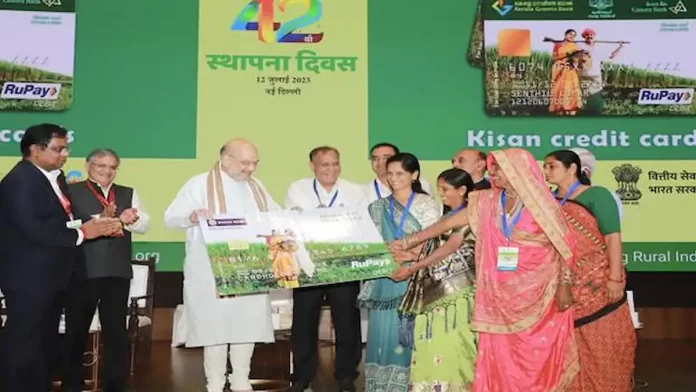Union Home Minister and Minister of Cooperation, Amit Shah on Wednesday addressed the 42nd Foundation Day function of NABARD as the chief guest at Pragati Maidan in New Delhi.
In his address, Shri Amit Shah said that India which has about 65 percent rural population cannot be imagined without NABARD.
He said that, NABARD has worked as the backbone of this country’s rural economy, infrastructure, agriculture, cooperative institutions and self-help groups of this country for last 4 decades.
“Country like India which has huge rural population cannot be imagined without NABARD, it has worked as backbone for rural economy, infrastructure, agriculture, cooperative institutions and self-help groups for last 4 decades”, he said further.
What is NABARD?
The National Bank for Agriculture and Rural Development (NABARD) is a specialized financial institution in India that plays a crucial role in fostering rural development, promoting agriculture, and ensuring financial inclusion.
NABARD was established on July 12, 1982, as an apex development bank in India, with its headquarters located in Mumbai, Maharashtra.
It was formed through the merger of the Agricultural Credit Department and Rural Planning and Credit Cell of the Reserve Bank of India (RBI).
NABARD operates under the purview of the Ministry of Finance, Government of India. It is governed by a Board of Directors, with representation from the Government of India, RBI, and professionals from various fields.
The Board provides strategic guidance and oversees the functioning of the organization.
Objectives and Mandate
The primary objectives and mandate of NABARD are as follows:
Promote and develop sustainable agriculture and rural development by providing financial support and related services.
Facilitate credit flow for agriculture and rural sectors through cooperative banks, regional rural banks (RRBs), and other financial institutions.
Provide refinance facilities to banks and other financial institutions engaged in agricultural and rural financing.
Undertake research and development activities to improve agricultural practices, rural infrastructure, and rural livelihoods.
Promote rural entrepreneurship, skill development, and capacity building through various initiatives.
Monitor and evaluate the implementation of various rural development schemes and programs.
Significance and Rural Impact
NABARD holds immense significance in rural India due to its multifaceted role:
Financial Inclusion: NABARD plays a pivotal role in promoting financial inclusion by ensuring credit availability to marginalized farmers, rural artisans, and small-scale entrepreneurs who lack access to formal banking services.
Agricultural Development: NABARD actively supports agricultural development by providing financial assistance, technical expertise, and capacity building to farmers. This facilitates the adoption of modern agricultural practices, enhances productivity, and promotes sustainable farming.
Rural Infrastructure: The organization promotes the development of rural infrastructure, such as irrigation systems, rural roads, storage facilities, and markets, to improve agricultural productivity and market access for farmers.
Present Works and Engagements
Rural Credit: NABARD acts as a refinancing institution for cooperative banks, RRBs, and other financial institutions, enabling them to provide affordable credit to farmers and rural communities. It supports credit programs such as Kisan Credit Card, Self-Help Groups (SHGs), and Joint Liability Groups (JLGs).
Rural Development Programs: NABARD actively participates in various rural development initiatives, such as watershed management, sustainable livelihood programs, and skill development projects. It collaborates with state governments, NGOs, and other stakeholders to implement these programs effectively.
Rural Infrastructure Financing: NABARD provides financial support for rural infrastructure projects, including irrigation, farm mechanization, rural connectivity, and renewable energy initiatives. This facilitates the overall development of rural areas and enhances the livelihoods of rural communities.
Potentials and Challenges:
NABARD holds vast potential to drive rural transformation and inclusive growth:
Innovative Financial Products: NABARD can further develop innovative financial products and services tailored to the specific needs of rural communities, including crop insurance, agri-based value chain financing, and microfinance solutions.
Technological Integration: Embracing digital technologies can enhance NABARD’s reach and efficiency in delivering financial services and information to remote rural areas.
Challenges and Shortcomings
NABARD faces certain challenges that need to be addressed:
Limited Awareness: Many small and marginal farmers, as well as rural entrepreneurs, are unaware of the financial and developmental opportunities provided by NABARD. Efforts to raise awareness and improve financial literacy should be strengthened.
Access to Credit: Despite NABARD’s initiatives, access to formal credit remains a challenge for some marginalized communities due to stringent eligibility criteria, lack of collateral, and bureaucratic processes. Ensuring inclusivity and flexibility in credit provision is vital.
Notable Achievements
- Microfinance Development Fund (MDF): NABARD established the MDF to support and strengthen the microfinance sector in India. The fund provides financial resources to microfinance institutions, enabling them to extend credit to underserved sections of society.
- Watershed Development Projects: NABARD has successfully implemented watershed development projects across the country, improving water availability, enhancing agricultural productivity, and supporting rural livelihoods.
Conclusion
NABARD’s journey in promoting rural development and financial inclusion in India has been instrumental in transforming the lives of millions of people.
Through its financial support, capacity building programs, and rural development initiatives, NABARD has played a significant role in empowering farmers, artisans, and rural entrepreneurs.
With its focus on sustainable agriculture, rural infrastructure, and financial inclusion, NABARD has the potential to further drive rural prosperity, bridge socioeconomic gaps, and contribute to India’s overall development.
By addressing challenges and leveraging its strengths, NABARD can continue to be a catalyst for rural transformation and inclusive growth in the country.
